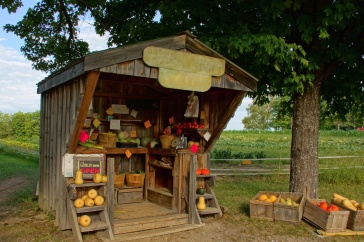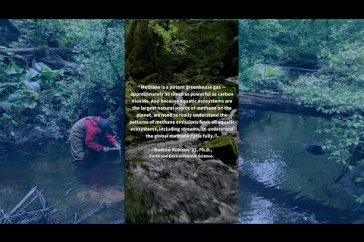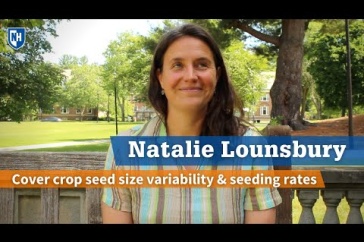The Fairchild Dairy Teaching and Research Center, a facility of the NH Agricultural Experiment Station (NHAES) at the University of New Hampshire College of Life Sciences and Agriculture (COLSA), has been awarded a 2014 Gold Quality Award by the Dairy Farmers of America.
 As a result of receiving the Gold Quality Award, UNH is paid the highest price for its milk – called quality premiums. Dairy Farmers of America is the leading national milk cooperative with nearly 13,000 dairy producers in 48 states. UNH’s milk goes to the Hood plant in Concord.
As a result of receiving the Gold Quality Award, UNH is paid the highest price for its milk – called quality premiums. Dairy Farmers of America is the leading national milk cooperative with nearly 13,000 dairy producers in 48 states. UNH’s milk goes to the Hood plant in Concord.
The Dairy Farmers of America tests milk for a number of factors that indicate herd health, hygiene, and sanitation. Among those is the somatic cell count. Dairy herds with a low somatic cell count tend to be more profitable herds since they have reduced treatment and veterinary costs for mastitis, which is the most common and costliest disease for dairy cattle, higher milk production per cow, and higher milk quality premiums.
“We have multiple tiers of quality premiums, and they are not easy to achieve. Farms really have to stay on top of things to get these extra premiums. I have been the field person for UNH for many years -- at least 20 -- and I don’t remember them not getting a quality award. UNH Fairchild Dairy staff Jon Whitehouse and John Weeks do a masterful job making high quality milk for DFA,” said Tim Riel, area supervisor for the Dairy Farmers of America.
Celebrating its 25th year of operation this year, the Fairchild Dairy Center develops new knowledge and management expertise geared directly toward many state and regional stakeholders. It houses 87 milking-age Holstein and Jersey cows and approximately 70 growing, replacement animals. Included in that number is the 20-cow, student-managed Cooperative for Real Education in Agricultural Management (CREAM) herd, with the remaining animals devoted primarily to research in the area of dairy nutrition and reproductive biology.
Cows at the Fairchild Dairy Center produce an average of about 26,000 to 27,000 pounds of milk per cow per year, which is greater than the national average of about 22,000 pounds per cow a year.
The Fairchild Dairy Center has been long recognized for its quality milk and operations. In 2013 and 2012, the farm received the Gold Quality Award from the Dairy Farmers of America. In 2013, the farm received a Quality Milk Award from Dairy One for consistently producing high quality milk with a low somatic cell count. In 1997 and 2004, Dairy One also recognized the CREAM herd having the highest quality milk from among approximately 3,100 dairy herds on the official Northeast Dairy Herd Improvement Association (DHIA) test. In 1999, the farm was cited as a Dairy of Distinction by the Milk Sanitation Board, which in 2000 awarded it a Certificate of Quality.
The Fairchild Dairy Center is located at 36 O’Kane Road off Mast Road Extension in Durham. It is open to the public seven days a week from 8 a.m. to 6 p.m. Visitors can observe the milking of cows at 3:30 p.m. each day. Map: http://www.colsa.unh.edu/nhaes/directions/Fairchild.
The Dairy Farmers of America is a leading milk marketing cooperative and dairy food processor. It serves nearly 13,000 members through marketing members’ milk, paying them a competitive price, and being a leader in the dairy industry. In addition, it offers programs and services that make it easier and more profitable for members to farm.
Founded in 1887, the NH Agricultural Experiment Station at the UNH College of Life Sciences and Agriculture is UNH’s original research center and an elemental component of New Hampshire's land-grant university heritage and mission. We steward federal and state funding to provide unbiased and objective research concerning diverse aspects of sustainable agriculture and foods, aquaculture, forest management, and related wildlife, natural resources and rural community topics. We maintain the Woodman and Kingman agronomy and horticultural farms, the Macfarlane Greenhouses, the Fairchild Dairy Teaching and Research Center, and the Organic Dairy Research Farm. Additional properties also provide forage, forests and woodlands in direct support to research, teaching, and outreach.
-
Written By:
Lori Tyler Gula, PhD | NH Agricultural Experiment Station | lori.gula@unh.edu | 603-862-1452




















































